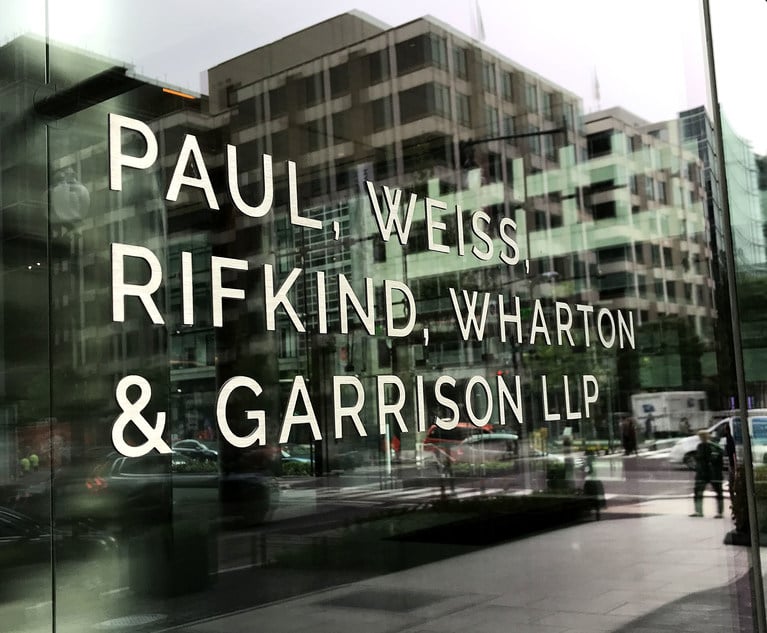Courts Are Rejecting Disclosure-Only Settlements
Rulings show disfavor for lawsuits filed after a company's announcement of a proposed merger.
August 22, 2015 at 09:34 PM
5 minute read
Nearly as certain as death, and far more than taxes, fiduciary duty litigation has become essentially automatic upon the announcement of a public company transaction. While a fraction of these class actions develop into contested litigation about the terms of a deal, the vast majority settle early, often for nothing more than additional disclosures in the merger proxy statement or other SEC filing and the payment of attorney fees.
Critics have often complained that these lawsuits, and these settlements, serve no useful purpose. But the courts have routinely approved such “disclosure-only” settlements throughout the merger litigation boom of the past 15 years. Now that seems to be changing.
In two cases last year, the Commercial Division of New York Supreme Court refused to approve “disclosure-only” settlements on the ground that they provided no substantial benefit to shareholders. As Justice Melvin Schweitzer noted in rejecting a settlement involving a large stock purchase agreement, a typical settlement requires absent class members to release all claims related to the transaction. Such a release, the court held, “cannot be justified” by the “trivial disclosure adjustments” obtained in many merger-case settlements.
This content has been archived. It is available through our partners, LexisNexis® and Bloomberg Law.
To view this content, please continue to their sites.
Not a Lexis Subscriber?
Subscribe Now
Not a Bloomberg Law Subscriber?
Subscribe Now
NOT FOR REPRINT
© 2025 ALM Global, LLC, All Rights Reserved. Request academic re-use from www.copyright.com. All other uses, submit a request to [email protected]. For more information visit Asset & Logo Licensing.
You Might Like
View All
Big Law Leaders, Dealmakers Optimistic About M&A Deal Flow Under Trump, With Caveats
5 minute read
New Merger-Review Process Could Doom Some Deals, Add Headaches, Subjectivity to Others
7 minute read
FTC Bans Exec From Chevron Board—Exercising Authority It Doesn't Have, GOP Dissenters Say
5 minute read
Paul Weiss Lands Skadden Co-Head of Financial Institutions Group in Two-Attorney Move
3 minute readTrending Stories
- 1Stevens & Lee Names New Delaware Shareholder
- 2U.S. Supreme Court Denies Trump Effort to Halt Sentencing
- 3From CLO to President: Kevin Boon Takes the Helm at Mysten Labs
- 4How Law Schools Fared on California's July 2024 Bar Exam
- 5'Discordant Dots': Why Phila. Zantac Judge Rejected Bid for His Recusal
Who Got The Work
Michael G. Bongiorno, Andrew Scott Dulberg and Elizabeth E. Driscoll from Wilmer Cutler Pickering Hale and Dorr have stepped in to represent Symbotic Inc., an A.I.-enabled technology platform that focuses on increasing supply chain efficiency, and other defendants in a pending shareholder derivative lawsuit. The case, filed Oct. 2 in Massachusetts District Court by the Brown Law Firm on behalf of Stephen Austen, accuses certain officers and directors of misleading investors in regard to Symbotic's potential for margin growth by failing to disclose that the company was not equipped to timely deploy its systems or manage expenses through project delays. The case, assigned to U.S. District Judge Nathaniel M. Gorton, is 1:24-cv-12522, Austen v. Cohen et al.
Who Got The Work
Edmund Polubinski and Marie Killmond of Davis Polk & Wardwell have entered appearances for data platform software development company MongoDB and other defendants in a pending shareholder derivative lawsuit. The action, filed Oct. 7 in New York Southern District Court by the Brown Law Firm, accuses the company's directors and/or officers of falsely expressing confidence in the company’s restructuring of its sales incentive plan and downplaying the severity of decreases in its upfront commitments. The case is 1:24-cv-07594, Roy v. Ittycheria et al.
Who Got The Work
Amy O. Bruchs and Kurt F. Ellison of Michael Best & Friedrich have entered appearances for Epic Systems Corp. in a pending employment discrimination lawsuit. The suit was filed Sept. 7 in Wisconsin Western District Court by Levine Eisberner LLC and Siri & Glimstad on behalf of a project manager who claims that he was wrongfully terminated after applying for a religious exemption to the defendant's COVID-19 vaccine mandate. The case, assigned to U.S. Magistrate Judge Anita Marie Boor, is 3:24-cv-00630, Secker, Nathan v. Epic Systems Corporation.
Who Got The Work
David X. Sullivan, Thomas J. Finn and Gregory A. Hall from McCarter & English have entered appearances for Sunrun Installation Services in a pending civil rights lawsuit. The complaint was filed Sept. 4 in Connecticut District Court by attorney Robert M. Berke on behalf of former employee George Edward Steins, who was arrested and charged with employing an unregistered home improvement salesperson. The complaint alleges that had Sunrun informed the Connecticut Department of Consumer Protection that the plaintiff's employment had ended in 2017 and that he no longer held Sunrun's home improvement contractor license, he would not have been hit with charges, which were dismissed in May 2024. The case, assigned to U.S. District Judge Jeffrey A. Meyer, is 3:24-cv-01423, Steins v. Sunrun, Inc. et al.
Who Got The Work
Greenberg Traurig shareholder Joshua L. Raskin has entered an appearance for boohoo.com UK Ltd. in a pending patent infringement lawsuit. The suit, filed Sept. 3 in Texas Eastern District Court by Rozier Hardt McDonough on behalf of Alto Dynamics, asserts five patents related to an online shopping platform. The case, assigned to U.S. District Judge Rodney Gilstrap, is 2:24-cv-00719, Alto Dynamics, LLC v. boohoo.com UK Limited.
Featured Firms
Law Offices of Gary Martin Hays & Associates, P.C.
(470) 294-1674
Law Offices of Mark E. Salomone
(857) 444-6468
Smith & Hassler
(713) 739-1250










